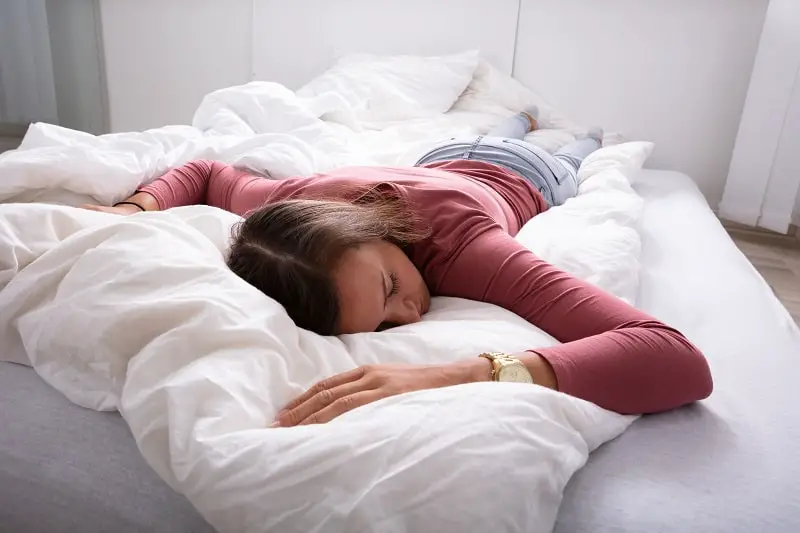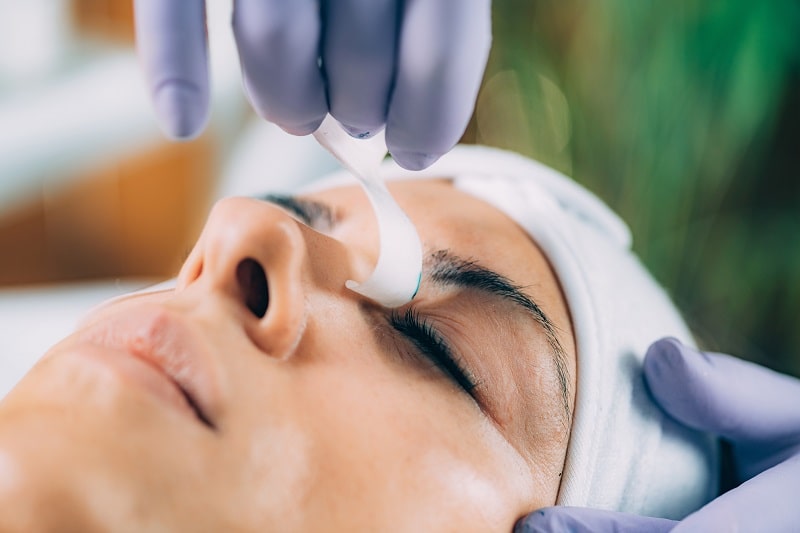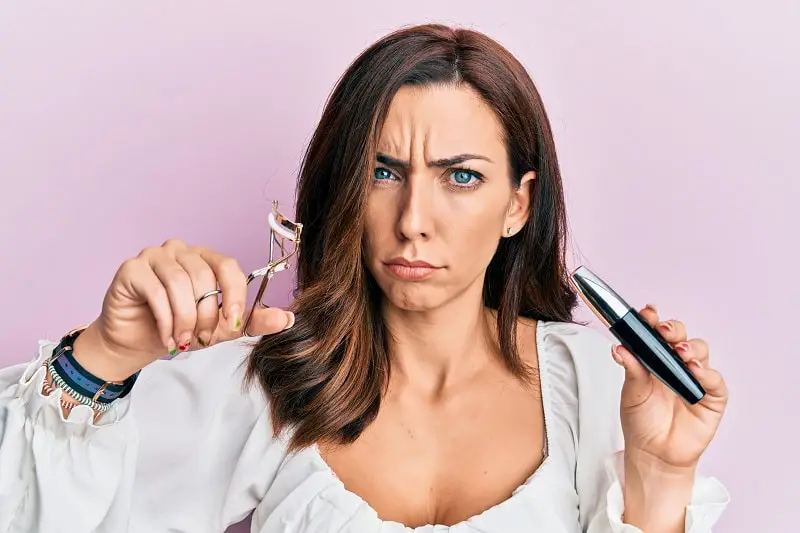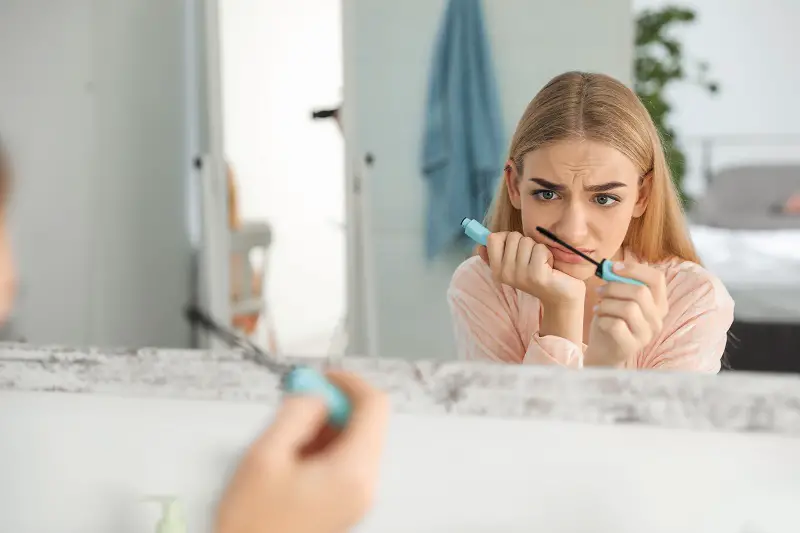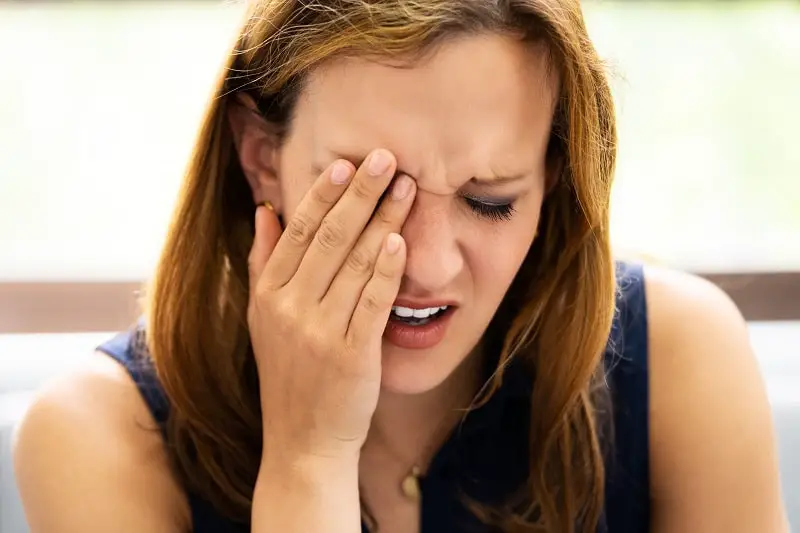Can you sleep with mascara on? Honestly, for all of us who get way too tired to remove makeup after a long day, the answer seems like an easy one. Or, at least, we want it to be an easy one. Unfortunately, there is no easy answer when it comes down to whether or not you can or should be sleeping in mascara after a long day.
This article will cover all the reasons you shouldn’t wear mascara—or any sort of makeup, for that matter—to bed. Also, if you had accidentally slept with some mascara on, don’t worry: we will cover what to do next. Hint: it isn’t the end of the world!
Before moving on, no, you should avoid sleeping with mascara on for a number of reasons. Not only do you risk a bacterial infection, but you also may have to deal with a myriad of other problems like irritation, dry skin, brittle lashes, and premature aging (in the long run, at least).
So, without further ado, keep reading for all the fun, interesting facts behind what really happens when you wear eye makeup to bed and why it isn’t in your favor to fall asleep in it.
Is It OK To Sleep With Mascara On?
No, sleeping with mascara on is not OK! In fact—if you can—avoid sleeping with mascara on at all costs. Putting aside the risk of an eye infection like pink eye (known also as conjunctivitis), there are tons of other reasons you should avoid resting your head while you are still wearing eye makeup.
To best define the beauty product as it is, mascara is a beauty product that adds length, color, and thickness to one’s own natural lashes. It enhances the eyes and is the second most popular beauty product in the world according to Harper’s Bazaar writer, Becki Murray.
With its allure and overall popularity, mascara is nearly everyone’s go-to makeup essential. That being said, mascara can be easily forgotten, especially if it is the only makeup being worn at the time.
Despite its popularity, versatility, and ease of access, mascara should never be slept in, as there are a number of risks associated with doing so.
Risks include the following:
Brittle Lashes
First things first, brittle lashes are a common after-effect of mascara use. Brittleness occurs when eyelashes that are coated in mascara are pulled at or rubbed; in turn, this tugs at the roots and leads to lash fall-out, root sensitivity, and irritation.
To combat excessively vulnerable lashes, moisturizing could help. There are a number of moisturizing serums on the market, however, if those evade you then there are easy, DIY moisturizers that could be made from the comfort of your own home using a number of natural oils.
Vaseline is another popular choice—simply remember to completely cleanse any and all oil or petroleum jelly from your eyelid or eyelashes afterwards.
Fine Lines And Wrinkles
To clarify, mascara alone does not cause fine lines and wrinkles. That being said, removing mascara can cause the development of premature aging of the skin. Generally, aggressive rubbing, pulling, and a generally poor removal technique are only a few of the direct causes of fine lines.
It is important to note that when an individual falls asleep in mascara, the product continues to dry and harden on the lashes it is coating. The continued drying process makes mascara more strenuous to remove and—despite all of our best efforts—could create fine lines thanks to the difficult removal.
Dryness And Irritation
Mascara can trigger eye-dryness when slept in from the product flaking off during rest. Likewise, irritation of the eye and surrounding skin happens when there is an event known as contact dermatitis—or, inflammation of the skin upon contact.
This is a common, minor allergic reaction that many people experience with a number of products, not all being makeup. And, unfortunately, it sometimes just happens.
Although it may seem sudden, your body was actually routinely exposed to the allergen in minor doses until it managed to identify what the exact issue was. Contact dermatitis isn’t contagious, or life-threatening, but can be extremely vexing to deal with.
Can Sleeping With Mascara Cause A Stye?
Sleeping with mascara can surely cause a stye. Styes are painful, red bumps. Usually, they are a direct result of one of the glands along your lash line becoming clogged. And, what is better at clogging pores than makeup?
It is no wonder that sleeping in mascara can cause a stye since the product rests so close to—if not immediately on—the lash line. The mascara can plug the glands, trapping in dirt and debris; this will lead to swelling and irritation.
Now, if you find yourself in the unfortunate circumstance of developing a stye, don’t panic. In most cases, a stye will go away on its own. A warm compress will hasten the process—just stay away from mascara during this time.
Also, most drug stores like CVS Pharmacy will carry eye drops specially formulated to ease stye symptoms. These droplets will make the short time you have the stye far more bearable, especially if your symptoms are more severe or distracting.
Of course, if you have any concerns over the development of a stye, or if the stye remains inflamed for more than the standard time, it wouldn’t hurt to make an appointment with your physician. They may have further knowledge of any helpful remedies.
Can Sleeping In Mascara Cause Pink Eye?
Yes, sleeping in mascara can certainly cause pink eye. Pink eye—also commonly referred to as conjunctivitis—is the inflammation of the conjunctiva.
In itself, the conjunctiva is the mucous membrane that surrounds the sclera (the white of the eyeball) that provides lubrication and protection. When it becomes inflamed, you can experience redness, itchiness, watery eyes, discharge, and general discomfort.
Furthermore, conjunctivitis that occurs from sleeping in mascara is usually bacterial in nature. It comes around when the bacteria within the mascara comes in contact with and infects the conjunctiva.
In most cases of pink eye, it will pass on its own. A cold compress will help reduce the inflammation and the itchy, burning sensation that comes with it.
Saying that, there are antibacterial eye drops available if you are looking to speed up the process and ease the ongoing symptoms. Check in with your doctor if you have more questions, and get ready for a small lecture about sleeping in your eye makeup.
Do I Need To Remove My Mascara Every Night?
Absolutely: you should remove mascara every night. Inadequate removal of mascara—or, alternatively, neglecting to remove mascara altogether—can lead to some serious problems down the line.
There was a 2017 case of a 50-year-old Australian woman who reported long-time use of mascara who went to an ophthalmologist after experiencing extensive irritation.
Only, the ophthalmologist discovered that the woman had poor makeup removal techniques and that leftover mascara had flaked off into the conjunctiva and gotten deposited into the mucous membrane.
The case study can be accessed here through the American Academy of Ophthalmology, though be warned: the images attached can be enough to turn a stomach.
Of course, the above is an extreme case and is certainly not commonplace. There is a higher risk of irritation and damage done to the eyelashes themselves.
On that fun note, don’t disregard thorough mascara removal. Make sure you get off as much mascara as you possibly can. For the health of your eyes and for the surrounding delicate skin, makeup removal is a crucial before-bed routine.
What To Do If You Slept With Mascara On?
If you slept with mascara on, don’t worry! Take off the mascara as soon as you wake up and follow up with a cleanser. After cleansing, it would be a good idea to follow up with a hydrating face mask for extra measure.
If you don’t have access to an effective makeup remover, check out our article titled “How To Take Off Mascara Without Makeup Remover” for some advice on the topic. Generally, sleeping with mascara on once won’t cause serious issues. Even a small handful of times won’t lead to any major problems.
In reality, the risk comes around when you make sleeping in mascara a regular habit, or when you are using a mascara product that has expired. That’s right: makeup, especially mascara, does expire. As a rule of thumb, toss out any mascara that is older than 3 months.
Although you can technically push it to 6 months, remember that mascara is a moist product that—once exposed to air—becomes susceptible to bacteria. If you suspect that your mascara has expired (if it is clumpy, smelly, or applies poorly) then it is best to cease application and get rid of it.
Now, if you sleep with mascara that may be expired, keep track of any unusual symptoms as they pertain to your eyes: any burning, itching, swelling, or unusual discharge should be reviewed by your physician.
These symptoms can arise even when sleeping in mascara that has not expired. All symptoms should be carefully monitored, as there is always a risk of conjunctivitis—although minimal, more often than not.
Final Thoughts: Can You Sleep With Mascara On?
To wrap it all up, let’s be safe rather than sorry: don’t wear mascara to bed. Seriously. If the 2017 images of mascara flake buildup beneath the eyelid weren’t enough to dissuade you, hopefully, all the other reasons why you shouldn’t wear mascara to bed were plenty.
More often than not, your risks include what you would likely expect. Outside of the realm of eye infections and inflammation like conjunctivitis and a stye, you also run the risks of having to manage irritation, breakage, and the development of early aging from inadequate skin care.
Remember that it is vital to note that there is very limited risk when sleeping in mascara only once or twice unless an allergen within the product is already present. At that point, if you are not already aware, you shouldn’t be wearing any makeup that you have a known allergy to, no matter how minor it may seem.
Risks of sleeping with mascara increase when dealing with expired mascara or when it becomes a regular habit. So, always be thorough when removing your mascara before bed.
Now, there are alternatives to mascara if you are not too thrilled about using that particular product after hearing about all of these adverse effects of sleeping in it.
These handful of alternatives include falsies, lash extensions, lash tints, eyelash balms, and creams. Each have their own pros and cons, therefore you should explore all the options before selecting a single one to replace your ol’ reliable mascara.
At best, now that you are aware of the risks that come with sleeping in mascaras and the options you have, do what makes you the most comfortable.
How you feel and the confidence you have in yourself is key. Simply put, you don’t have to follow the advice and information in this article, but hopefully, with the new information, you are able to make an effective decision moving forward on your beauty journey.
Recommended
If you enjoyed reading this article, check out some of our other amazing blog posts:

